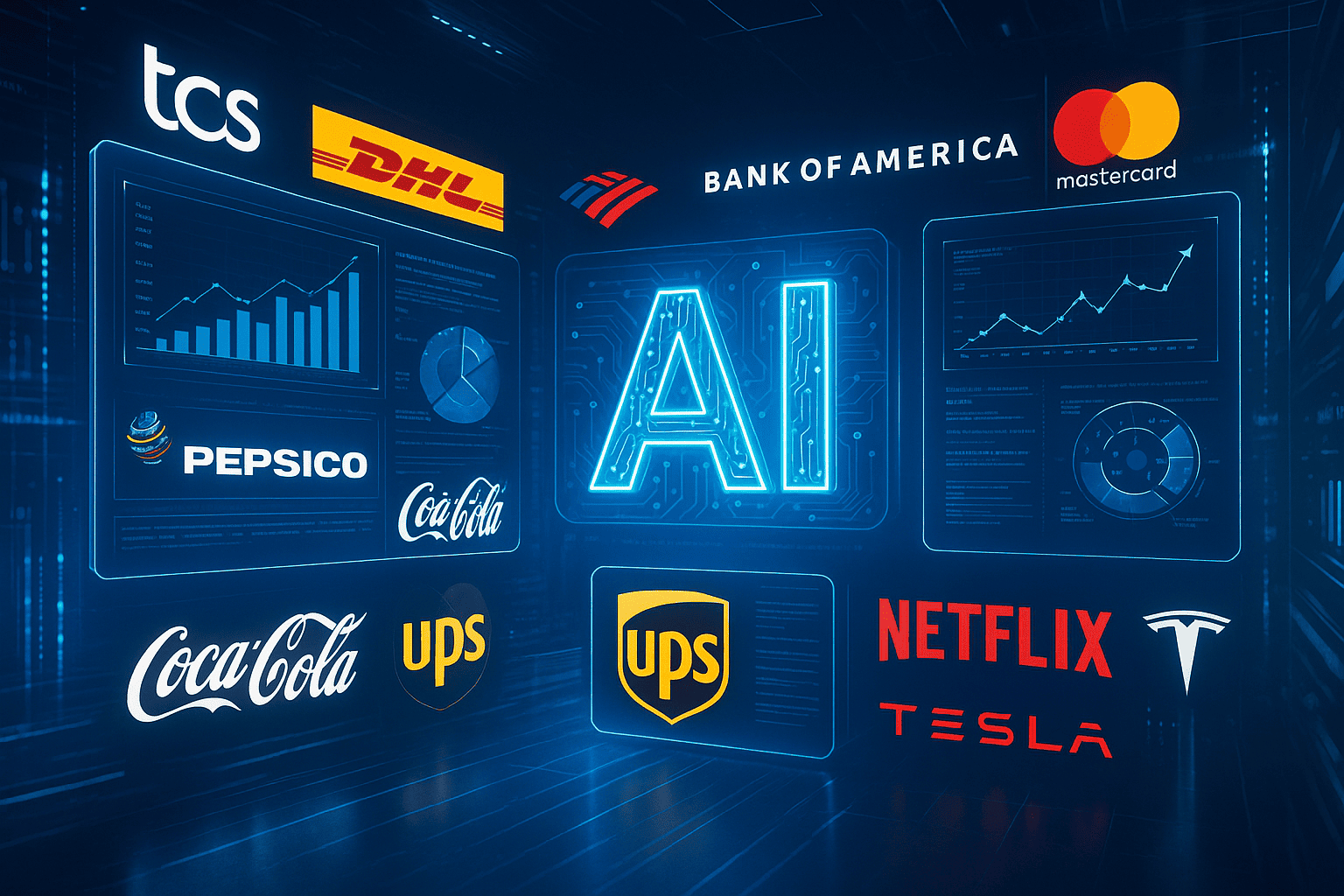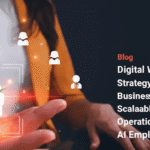Artificial Intelligence has rapidly shifted from being a futuristic concept to a practical driver of business transformation. AI in business is no longer optional. It is reshaping operations, decision-making, and customer engagement across industries. Companies use it to cut costs, improve efficiency, forecast demand, personalize experiences, and build resilience in a competitive economy.
This article explores how organizations are applying AI in business today with real-world case studies, key insights, and best practices that highlight both the opportunities and the challenges of adoption.
How AI in Business is Creating Real Impact
The role of AI is best understood through the way companies are already using it.
| Company | AI Application | Impact/Result |
|---|---|---|
| TCS | Dedicated AI Transformation Unit | Restructuring operations to scale AI across services |
| DHL | AI-powered voice systems for logistics | Handles 1M+ calls monthly; blends automation with human oversight |
| Bank of America | “ask MERRILL” and compliance automation | $4B investment; 1,400+ AI patents; improved efficiency and personalization |
| Mastercard | Fraud detection and personalization systems | Reviews 159B+ transactions; fraud detection up 300%; reduced false declines |
| PepsiCo | AI for demand forecasting, logistics, and product R&D | Improved forecasting and smarter production across global operations |
These examples show that artificial intelligence in business takes many forms. TCS demonstrates how leadership integration drives success, while DHL illustrates the importance of blending AI with human oversight. In finance, Bank of America and Mastercard reveal how AI strengthens compliance and security while also enhancing personalization. Meanwhile, PepsiCo shows how AI can drive innovation in forecasting and manufacturing.
Key Insights on AI in Business
From boardrooms to production floors, AI is influencing how businesses operate and make decisions. A few insights stand out:
- AI is moving into leadership roles. Surveys reveal that 74% of executives trust AI insights more than human colleagues, and nearly half would allow AI to override their own judgment.
- Resilience comes from AI agents and synthetic data. These tools allow businesses to adapt to disruptions and scale faster.
- Ethical use determines long-term success. Backlash over AI-driven layoffs shows that companies must balance efficiency with fairness, transparency, and trust.
These insights make it clear that AI in business today is not just about technology. It is about leadership vision and responsible adoption.
Best Practices for Successful AI Adoption
Implementing AI requires more than simply choosing the latest tools. It starts with a clear sense of purpose. Businesses need to define what they want AI to achieve, whether that is reducing costs, enhancing customer engagement, or streamlining compliance processes. Once goals are established, the next step is ensuring the quality of the data that powers AI systems. Without clean, reliable, and well-structured data, even the most advanced models will fall short.
Equally important is the team behind the adoption. Companies that build cross-functional groups combining data scientists, engineers, domain experts, and ethical advisors tend to create more balanced and effective solutions. Training executives and employees to understand AI is also crucial. When staff members see artificial intelligence as an enabler rather than a threat, adoption becomes smoother and more productive.
Ethical governance must be woven into every stage of the process. Transparency, fairness, and accountability are not optional if AI is to earn the trust of both employees and customers. Finally, businesses should remember that AI is not a one-time project but an evolving capability. Continuous monitoring, model updates, and refinements are necessary to keep AI aligned with business objectives and market realities.
Broader Applications Across Industries
The adoption of AI in business is visible in nearly every sector:
- Coca-Cola uses AI to optimize digital marketing campaigns in real time.
- UPS applies AI to route optimization, saving millions of miles annually.
- JPMorgan Chase automates legal document review through its COiN system.
- Unilever uses AI tools for recruitment, analyzing candidate interviews more efficiently.
- Netflix relies on AI for personalized content recommendations.
- Tesla integrates AI into its autonomous driving systems, redefining mobility.
These broader examples show that artificial intelligence is not limited to one niche. Instead, it is driving innovation across industries, reshaping how products are delivered, how customers are served, and how decisions are made.
Conclusion
The future of AI in business is not about whether organizations will use it, but how thoughtfully they adopt it. Case studies from TCS, DHL, Bank of America, Mastercard, and PepsiCo show that success requires more than technology. It demands leadership, strong data foundations, ethical governance, and ongoing refinement.
Companies that see artificial intelligence as a strategic partner, rather than a quick fix, are already gaining a competitive edge. For others, the lesson is clear: adopting AI in business today is no longer optional. It is essential for growth, innovation, and resilience in the digital age.
Take the Next Step with Scale Through Automation
At Scale Through Automation (STA), we help businesses just like yours unlock the full potential of AI. Whether you want to streamline operations, improve customer experiences, or scale efficiently, our team is ready to design solutions tailored to your needs.




Looking forward to reading more from you.